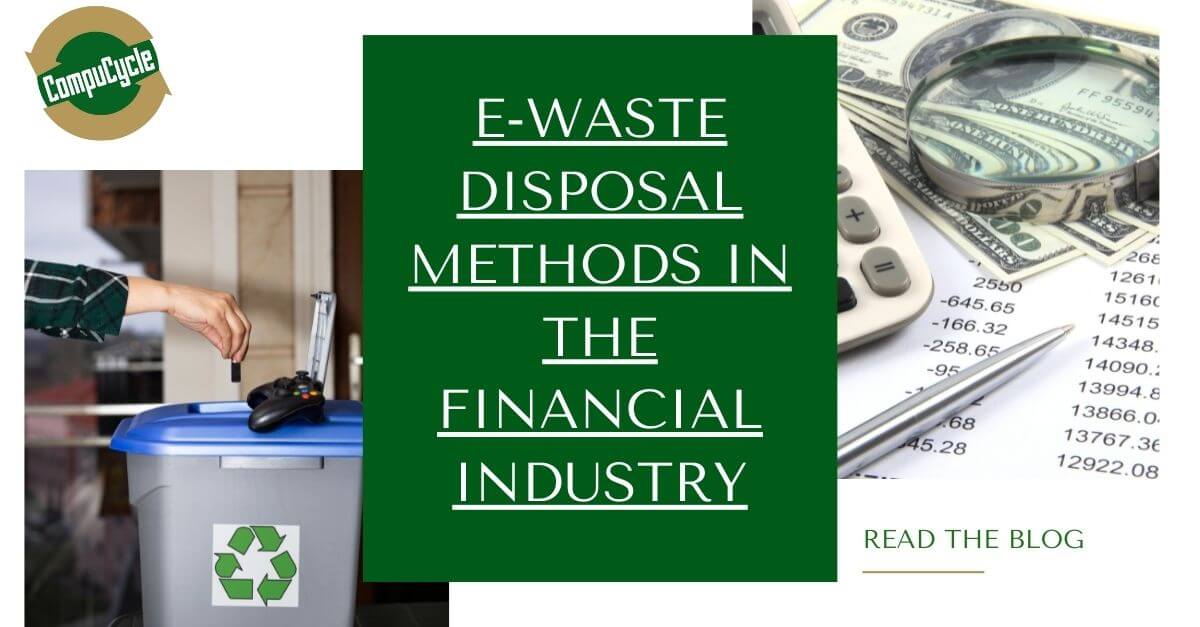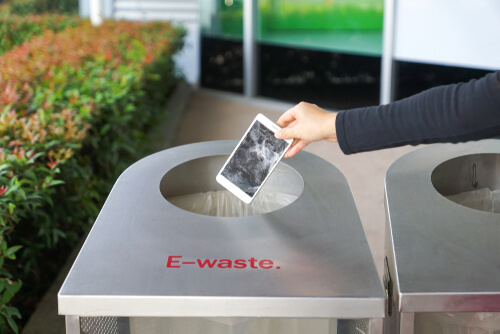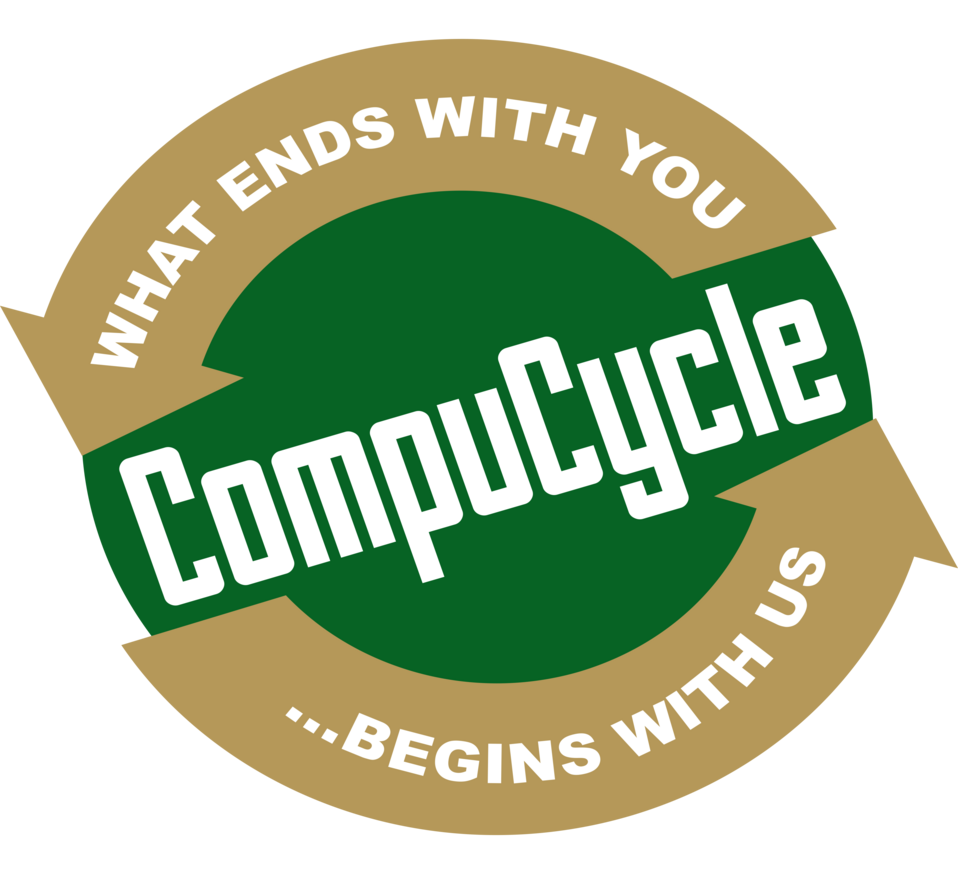
Out of all the industries, the financial industry faces the most stringent of oversights pertaining to sensitive and confidential consumer data security due to the collection, storage, and transmission of consumer credit reports. There are a number of standards and regulatory bodies that layout frameworks and best practices for financial institutions, requiring them to exercise caution and great care when it comes to data destruction at the time of retirement of legacy storage devices and equipment. E-waste disposal that is compliant with these regulations is the best of the various e-waste disposal techniques offered by many e-waste management companies in the market.
If you represent a business in the financial sector and are wondering about how to dispose of electronic waste in a manner that fulfills your legal responsibility towards consumer data security, opting for a certified and highly responsible e-waste management service is the best way to ensure it. CompuCycle employs the best e-waste disposal methods that securely wipe off your data from the face of the earth without it reaching unauthorized hands.

Institutions That Fall Under FTC Disposal and GLB Safeguards
GLB Safeguards and FTC Disposal are the primary regulatory bodies when it comes to secure and proper e-waste disposal. The two cover more than just investment firms and banks and encompass all organizations that access or store the financial information of consumers. Some of such institutions are:
- Professionals who prepare tax
- Payday lenders
- Credit reporting agencies
- Check-cashing businesses
- ATM operators
- Non-bank lenders
- Mortgage brokers
- Courier services
- Auto or other dealerships that assist with financing
- Personal Property or Real Estate Appraisers
FTC Disposal Rules and GLB Safeguards
GLB or Gramm Leach Bliley safeguards are a set of best practices used in the disposal of e-waste. They layout regulations regarding how financial institutions should handle sensitive consumer information. FTC or Federal Trade Commission is the implementation body that enacts actionable rules. According to the FTC:
“Any person who maintains consumer data for a business purpose must properly dispose of such information by taking reasonable actions to protect against unauthorized access to or use of the information in connection with its disposal.”
The GLB and FTC signify the importance of disposal of e-waste by mandating all financial institutions to ensure the following steps of e-waste disposal:
- All financial institutions need to assign a manager that supervises the disposal of all consumer data and records that the organization holds.
- Due diligence must be performed before selecting a third-party vendor (e-waste management and ITAD firm), and it must be certain that the vendor is certified by an organization that is recognized within the industry.
- It must be ensured that all data on the electronic equipment is erased before it is disposed of. This includes all storage devices, hard drives, computers, cell phone,s and any other hardware that may hold consumer data.
The easy and short answer for all financial institutions to the question, “How do we dispose of e-waste in a manner that we stay compliant with all the regulations, laws, and standards out there?” is hiring an R2 certified e-waste disposal company, like CompuCycle. The electronic waste management firm is specialized in securely and permanently removing data from electronic products, devices, and equipment of financial institutions with the help of compliant e-waste disposal methods. It not only offers its clients to be physically present on-site at the time of hard drive destruction and disposal but provides them with proper documentation as well.
Responsible and Compliant E-Waste Disposal Methods
A certified and reliable vendor has to be a part of your security strategy for all the consumer data that your company owns and holds. All the information that is redundant for your business needs to be securely and completely destroyed for you to be fully protected from the liability of consumer data breaches. Here are a few things that responsible ITAD companies ensure:
Security and Protection of Data
A certified ITAD company sanitizes and destroys all the sensitive data pertaining to your consumers, employees, and the financial operations of the enterprise prior to disposing of or recycling of e-waste. It does so by employing modern and secure e-waste disposal methods.
Secure Chain of Custody
A secure e-waste disposal firm constantly and strictly monitors its full chain of custody and prepares an audit report containing information about the possessors of your assets at each stage.
Modern Safety Systems and Documentation
A reliable e-waste management company understands the importance of disposal of e-waste and the need for our business to be compliant with its pertaining regulations. Therefore, it keeps its facility equipped with modern safety equipment and systems and offers proper documentation after IT asset recycling and disposal.
Get in touch with CompuCycle today to schedule a pickup of your IT assets and data-holding hardware to ensure full compliance with all the e-waste management regulations and standards out there.
Recent Articles
How ITAD and Cybersecurity Work Together to Reduce the Impact of Insider Threats
In an era where data breaches are increasingly common, safeguarding information is crucial. Insider threats, whether stemming from malicious intent or unintentional actions, pose significant risks to organizations. A recent study by ID Watchdog revealed…
Read MoreWhen to Choose Data Sanitization Over Data Destruction: A Guide to Data Lifecycle Management for IT Managers
Imagine a data breach that exposes your company’s trade secrets. Or worse, a regulatory violation due to improper data disposal. These scenarios can have devastating consequences. As the stewards of corporate data, IT managers must…
Read MoreHow Procurement Drives ESG Success in IT Asset Disposition
In today’s corporate landscape, sustainability is no longer a buzzword but a core component of business strategy. Environmental, Social, and Governance (ESG) criteria are increasingly influencing decision-making processes across all levels of organizations. One area…
Read More2024 Customer Survey
Thank you so much for your time as CompuCycle is so grateful to work with you, and we strive for continuous improvement to exceed your expectations. A survey will appear on this page if you…
Read More


